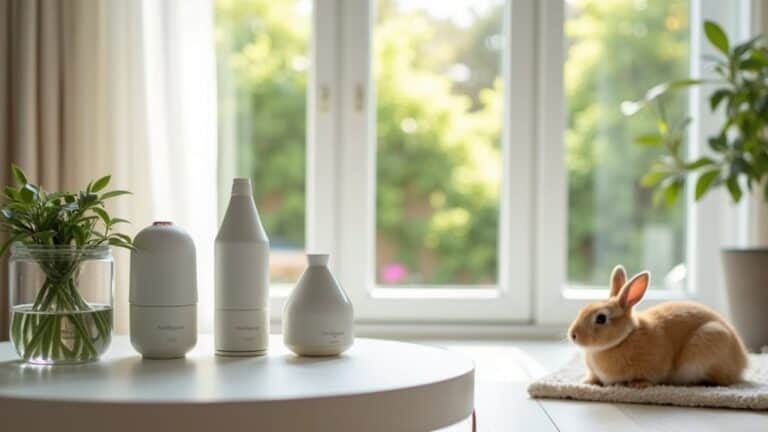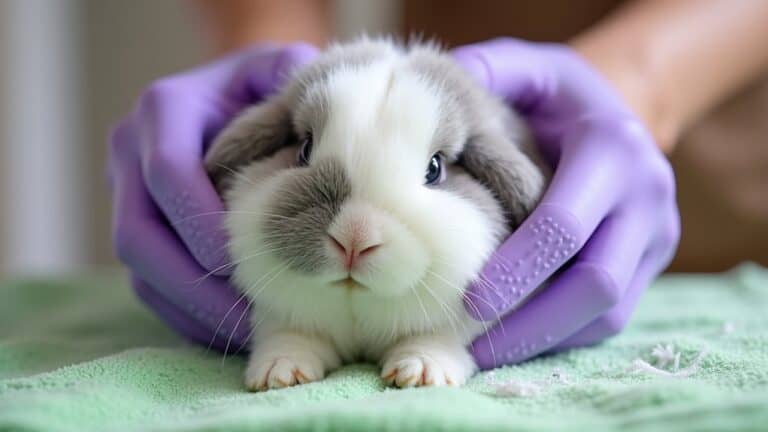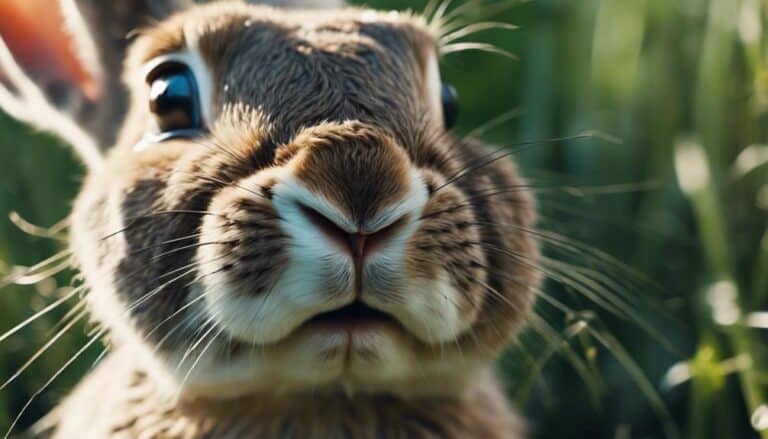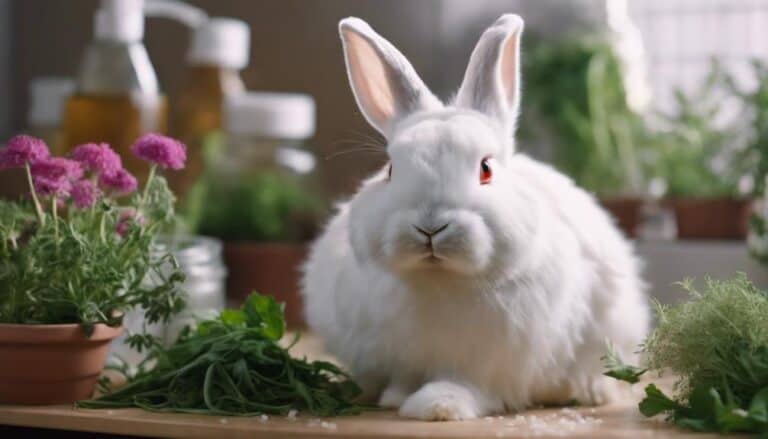As you navigate the world of caring for your elderly rabbit, you'll find that choosing the right diet is essential to their well-being. Imagine the peace of mind that comes with knowing you're providing your furry friend with the best nutrition possible as they age gracefully.
But what exactly constitutes a top diet for elderly rabbits, and how can you guarantee your rabbit's diet aligns with their changing needs? Let's explore the intricacies of senior rabbit diets together to help you make informed decisions for your beloved companion.
Contents
- 1 Key Takeaways
- 2 Age Considerations for Elderly Rabbits
- 3 Physical Signs of Aging in Rabbits
- 4 Common Health Concerns in Senior Rabbits
- 5 Environmental Adaptations for Senior Bunnies
- 6 Senior Rabbit Grooming Tips
- 7 Tailored Diet Recommendations for Elderly Rabbits
- 8 Monitoring Weight and Nutrition for Aging Rabbits
- 9 Importance of Regular Veterinary Check-ups
- 10 What are the best diets for elderly rabbits to ensure their health and wellbeing?
- 11 Frequently Asked Questions
- 12 Conclusion
Key Takeaways
- Monitor weight and adjust nutrition for senior rabbits.
- Provide essential nutrients like hay, greens, and vitamins.
- Regular vet check-ups and tailored care plans are crucial.
- Balance diet and hydration to support aging rabbit health.
Age Considerations for Elderly Rabbits

When caring for elderly rabbits, it's important to take into account their age-related changes and specific needs to provide the best care and guarantee their well-being.
Senior rabbits, typically aged 6-8 years old, with larger breeds showing signs of aging as early as 4 years, are more prone to health issues. Age-related changes in rabbits can manifest as thinning fur, muscle loss, weight loss, and decreased activity levels. These changes can impact their overall well-being and quality of life.
It's vital to be observant of any physical signs of aging in senior rabbits, such as scaling on ears, reduced climbing ability, and general weakness. Due to their age, senior rabbits are more susceptible to various health concerns and medical conditions, necessitating closer monitoring for early detection and prompt treatment.
Providing individual attention and specialized care tailored to the specific needs of older rabbits is essential in ensuring their health and happiness in their senior years.
Physical Signs of Aging in Rabbits
As your rabbit ages, you may notice physical changes that indicate the progression of time.
These changes can manifest in various ways, such as thinning fur, muscle loss, and weight fluctuations.
Understanding these signs is important for addressing the evolving needs of your elderly rabbit.
Aging-Related Physical Changes
Elderly rabbits exhibit a range of physical signs of aging, including thinning fur, muscle loss, weight loss, and decreased activity levels. These changes are indicative of the natural aging process and require special attention to make sure the well-being of your aging rabbit.
Here are some common aging-related physical changes to look out for:
- Thinning fur
- Muscle loss
- Weight loss
Keep a close eye on these signs as your rabbit ages, especially if they're experiencing old age or losing weight rapidly. Regular monitoring and tailored care can help address these physical changes and make sure your elderly rabbit stays healthy and comfortable.
Health Implications of Aging
The physical signs of aging in rabbits encompass various health implications that necessitate attentive monitoring and specialized care to maintain their well-being and comfort. As rabbits age, you may notice thinning fur, muscle loss, weight loss, and decreased activity. Look out for scaling on ears, reduced climbing ability, and overall weakness as common physical signs of aging in elderly rabbits.
With advanced age, senior rabbits face heightened risks of painful illnesses that can restrict their mobility. Keep an eye out for health concerns such as cataracts, arthritis, limb paralysis, and sore hocks. To important, guarantee the well-being of your elderly rabbits, it's critical to feed them a balanced diet and provide the necessary care tailored to their specific needs.
Common Health Concerns in Senior Rabbits
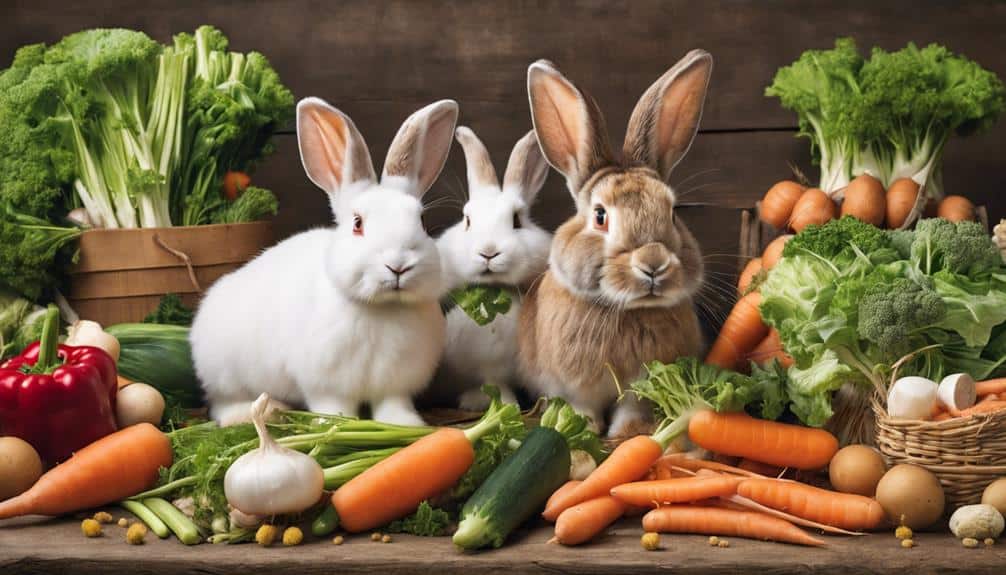
Common health concerns in senior rabbits encompass a range of issues including dental problems, arthritis, and gastrointestinal issues that necessitate vigilant monitoring and timely intervention to maintain their well-being. These concerns are prevalent in older rabbits due to age-related changes in their bodies. Here are some key health issues to watch out for in senior bunnies:
- Dental Problems: Older rabbits are prone to dental issues such as overgrown teeth and malocclusion, which can affect their ability to eat and lead to nutritional deficiencies.
- Arthritis: Arthritic changes in senior rabbits can cause pain, reduced mobility, and discomfort, requiring proper veterinary care and pain management strategies.
- Gastrointestinal Issues: Senior rabbits are at a higher risk of gastrointestinal stasis, a condition that can result in serious digestive problems and necessitate immediate veterinary attention to prevent further complications.
Being aware of these common health concerns and providing appropriate care can help ensure a better quality of life for your aging rabbit. Regular veterinary check-ups and a suitable diet can play an important role in maintaining their health and well-being.
Environmental Adaptations for Senior Bunnies
When adapting the environment for senior rabbits, make sure to provide soft and cushioned surfaces to protect their delicate joints and bones.
Use low-entry litter boxes to accommodate decreased mobility, making it easier for them to access.
Additionally, create a stress-free living space with minimal disturbances to promote relaxation and comfort for elderly bunnies.
Senior Rabbit Habitat Modifications
To enhance the living environment for senior rabbits, contemplate implementing soft, cushioned surfaces with non-slip flooring and low-entry litter boxes to support their mobility and comfort. When modifying the habitat for elderly bunnies, you should also focus on providing mental stimulation and a stress-free atmosphere.
Here are some key modifications to contemplate:
- Soft and Cushioned Surfaces: Opt for gentle flooring to prevent injuries and discomfort.
- Low-Entry Litter Boxes: Make it easy for your senior rabbit to access their litter box without strain.
- Puzzle Toys and Gentle Exercises: Encourage movement and mental stimulation while keeping stress levels low.
Comfortable Living Space Changes
Implement soft, padded surfaces and low-entry litter boxes to create a comfortable living space for senior rabbits, ensuring their joints are cushioned and mobility is optimized. As rabbits age, their joints become more sensitive, requiring extra care to prevent discomfort. Providing a soft, padded area helps cushion their aging joints and reduces pressure on these delicate areas.
Low-entry litter boxes are essential for senior rabbits with decreased mobility, making it easier for them to access their designated bathroom areas. Additionally, creating a stress-free environment with minimal noise and disturbances promotes relaxation and comfort for elderly bunnies.
Ensuring appropriate flooring, such as carpet or rugs, helps prevent slipping and provides traction for aging rabbits, further supporting their mobility and overall well-being.
Senior Rabbit Grooming Tips

Regular grooming of elderly rabbits is essential to prevent matting, maintain skin health, and monitor for any signs of health issues such as overgrown nails or ear mites. When grooming your senior rabbit, follow these important tips:
- Check for Overgrown Nails: Trim nails regularly to make sure they don't curl into the rabbit's paw pads, causing discomfort and potential infections.
- Inspect Teeth: Make sure your rabbit's teeth aren't overgrown or misaligned, as dental issues can lead to eating difficulties and pain.
- Ear Care: Clean your rabbit's ears gently with a damp cloth to make certain the buildup of wax and debris is prevented, which can attract mites and lead to infections.
While grooming, also pay attention to any changes in your rabbit's skin, mobility issues, or signs of arthritis. By maintaining a regular grooming routine and being observant during these sessions, you can help ensure your elderly rabbit's overall well-being and catch any potential health problems early.
Tailored Diet Recommendations for Elderly Rabbits
When caring for your senior rabbit, ensuring they receive a tailored diet is essential for meeting their specific nutritional requirements as they age. Senior rabbits benefit greatly from extruded nuggets formulated for their age, providing essential nutrients tailored to their changing needs. Adjust the pellet intake according to their weight, aiming for approximately one tablespoon per kilogram of body weight to maintain a healthy diet.
High-quality pellets are critical for senior rabbits to make sure they receive the necessary nutrients for their well-being. Keep a close eye on your rabbit's weight to make necessary adjustments in pellet amounts, preventing issues like obesity or malnourishment. Additionally, incorporate leafy greens into their diet, as they're rich in essential vitamins and fiber that support overall health, including maintaining healthy rabbit eyes.
Regularly evaluating your senior rabbit's diet is key to making sure they receive adequate nutrition tailored to their age and health condition.
Monitoring Weight and Nutrition for Aging Rabbits
Monitoring the weight and nutrition of aging rabbits is essential to ensuring their overall health and well-being. To effectively care for your senior rabbit, it's important to pay close attention to their weight changes and pellet intake.
Here's how you can monitor and adjust their diet accordingly:
- Regular Weight Checks: Weigh your elderly rabbit frequently to track any fluctuations in their weight. Sudden drops or gains can indicate underlying health issues that may require dietary adjustments.
- Pellet Intake: Senior rabbits may need increased pellet consumption to maintain their weight and meet their nutritional requirements. Aim for approximately a tablespoon of pellets per kilogram of body weight to support their health.
- Nutritional Adjustments: Adjust the senior rabbit's diet as they age to provide the necessary nutrients for their well-being. Consider offering high-quality extruded nuggets specifically formulated for senior rabbits to ensure they receive adequate nutrition.
Importance of Regular Veterinary Check-ups
Guarantee the essential health and well-being of your elderly rabbit by prioritizing regular veterinary check-ups every 6 months. These check-ups are important for monitoring the overall health of your rabbit as they age.
Veterinarians possess the expertise to detect early signs of illness or age-related issues during these routine examinations. By conducting regular check-ups, specialized care plans can be tailored to address any specific needs or conditions identified in your elderly rabbit.
Annual visits are highly recommended for all rabbits to make sure preventive care and early intervention for any potential health concerns that may arise. Consulting a rabbit-savvy vet before implementing any changes in diet or care is essential to provide the best possible support for your aging rabbit.
What are the best diets for elderly rabbits to ensure their health and wellbeing?
The best diets for elderly rabbits are ones that prioritize high-quality hay, fresh vegetables, and a small amount of pellets. It’s important to provide a balanced diet to ensure their health and wellbeing, especially in combination with regular veterinary care, including vaccinations for pet rabbits.
Frequently Asked Questions
What Is the Best Rabbit Food for Senior Rabbits?
For senior rabbits, the best rabbit food includes dietary supplements to support their aging bodies and maintain digestive health. High-quality pellets, adjusted to body weight, are critical. Monitoring signs of aging guides you in providing the best nutrition.
What Do You Feed an Elderly Rabbit?
Feed your elderly rabbit a diet rich in fiber to promote oral health and prevent digestive issues. Confirm they receive proper nutrition from high-quality pellets tailored for seniors, adjusting intake based on weight to support overall well-being.
What Should I Feed My Rabbit by Age?
For age-appropriate nutrition, feed your rabbit a balanced diet that changes with age. Young rabbits need alfalfa hay and pellets, while older rabbits benefit from timothy hay and limited pellets. Consider dietary supplements for elderly rabbits to support their health.
How Do You Help Senior Rabbits Gain Weight?
To help your senior rabbit gain weight, focus on high-quality pellets and adjust intake based on weight. Supplement with fresh greens and hay for extra calories. Consult a vet for personalized advice on nutritional supplements and exercise routines.
Conclusion
To sum up, it's important to remember that proper care and attention to detail are essential in ensuring the health and well-being of elderly rabbits. By following the tailored diet recommendations, monitoring weight and nutrition, and scheduling regular veterinary check-ups, you can help your aging companion live a longer, happier life.
Remember, just like fine wine, senior rabbits only get better with age when given the proper care and love they deserve.

